Zakaria Zhou: From Drug Dealer to Gospel Bearer
Zakaria Zhou Zhao Zong.
The alliteration of the ‘Z’s in his name catches one’s eye and ear.
Learn about his life and it is no less explosive as the syllables in his name.
In Primary 5, he smoked his first cigarette.
In Secondary 1, he was gambling hundreds of dollars online on soccer matches.
In Secondary 2, he became an online gambling agent, responsible for helping his peers start online betting accounts.
He also joined a secret society, befriended prostitutes and began selling methamphetamine (Ice) to them.
When the time for National Service* came, he continued gambling and drug dealing. It was also then that he first tasted Ice in the toilet of a shopping center in Orchard Road, a street in Singapore.
“I still remember the person who introduced me to Ice telling me that the drug was very addictive and warning me from using it each time I took it,” says Zakaria, now 32.
When people close to him got caught for drug possession, Zakaria became fearful of his own safety, and told his father he wanted to start life anew by going to Australia to study. By then, his parents had already helped him clear about S$100,000 in gambling debts.
However, in Australia, he fell back into his former hedonistic lifestyle. Once after winning a sum of money at the casino, he hailed a cab and told the cab driver to drive him to the dodgiest place he knew. He landed up at Kings Cross, a red light district filled with drug peddlers.
Drugs in Australia cost about four times more than in Singapore. To finance his gambling and drug use, he began applying the business “model” he learned back in Singapore. He bought drugs from dealers at Kings Cross and resold them to addicts, prostitutes and transvestites at the notorious inner city.
During this period, he dropped out from one university only to apply to another so that the school would not report him to immigration and revoke his student visa. Each time, he made half-hearted promises to his parents that he would buckle down and study hard.
After paying for him through three universities over three to four years in Sydney, his parents became fed up. They agreed to pay for his course in the fourth university on the condition that he move to Brisbane to study instead, where he would live with a family friend who agreed to keep an eye on him, and go for regular urine testing to make sure he was clean from drugs.
Things were fine in his first year in university at Brisbane. But all hell broke loose in his second year there.
Instead of smoking drugs, he started injecting them into his bloodstream. Drugs were expensive and since he could only afford a few milligrams of Ice, he needed to inject it directly into his blood to feel its effect. He shot himself with so much drugs that many of his veins collapsed and were clogged up.
His parents learned about it and sent him to an expensive rehabilitation program that lasted a month and cost S$30,000. Staff at the private hospital counseled him and showed him how to overcome the triggers to his behavior. Yet three days after he completed the program, his drug habit relapsed.
Concerned, his family friend told him to move out as they had young children around the house.
Once Zakaria had free rein at his own place, he linked up with other criminal groups and his drug dealing operations expanded. His drug habit also fed and funded his gambling lifestyle.
“I enjoyed the thrill of making easy money from gambling, it’s even easier than selling drugs. Even if I lost, I didn’t care as I could always sell more drugs,” says Zakaria.
However, his gambling spiraled out of hand. He found himself unable to pay the debt he owed the mafia and resorted to cheating other international students of their money.
“I felt remorse about taking advantage of their naivety but such feelings did not last long because I needed the money,” he says.
During his time in Australia, Zakaria had a Korean girlfriend. They broke up because of his drug habit and she went back to Korea pregnant with his child.
In 2014, his student visa expired and he had to return to Singapore without getting his degree. He moved back home, got a job as a waiter in a hotel and yet persisted in gambling and taking drugs during the weekends. Not before long, loan sharks and moneylenders began hounding him. Once again, his parents paid off a $30,000 debt for him.
“My parents were a safety net for me and so I always tell them it’s the last time I am asking them for help even though I kept slipping back into old patterns of behavior when things got better,” says Zakaria.
This time, his father gave him an ultimatum to move out and rent his own place.
The Turning Point
At the age of 29, he found himself homeless after he could not pay for the second month of his rent. By then, he was attending a gambling support group once a week at One Hope Centre after he saw their hotline on a billboard at a bus stop and called them up out of desperation.
“I had no other option. I felt lonely, condemned and useless because I couldn’t crash at my friends’ homes for long and my family had cut off contact with me,” says Zakaria.
One Hope Centre referred him to The New Charis Mission, a Voluntary Welfare Organization that runs a Residential Rehabilitation Program.
“My life was a total mess. I was desperate and everything seemed hopeless. Who can save me now?” thought Zakaria.
In 2016, he admitted himself into New Charis’ residential program because he was at the end of his tether and needed a roof over his head.
While he was in there, some of the other residents shared with him how their lives were transformed after they found God. They kicked their addictions, reconciled with family members and were earning a decent wage.
Zakaria wondered: “Are you sure God is so good? Who is this God?”As a young boy, he used to follow his mother to church on Sundays. His father traveled for work most of the time and Zakaria went to church because he wanted to please his mother, who he knew loved him.
At that time, he was not interested in God and all those “Christian stuff” and would take smoke breaks during the church service and wait for his mother outside.
At New Charis, Zakaria was intrigued by this God because of conversations with Johnny, a staff and mentor there.
“You wouldn’t understand my situation,” he told Johnny. “All of you only smoked drugs but I was the hard core one injecting myself for years.”
Johnny related to him his own life story of being a drug addict who shot himself with drugs for over 20 years before encountering the love of God.
Zakaria then knew that if someone like Johnny could do it with God’s strength, he could too.
On the third day of the rehabilitation program, one of the residents there shared Revelation 3:20 with him, telling him that Jesus was knocking at his door and all he needed to do was to let Him in.
Sick and tired of his life of debauchery, Zakaria told God, “If you are real, please change my life. I promise to give you this one year of my life and I would either kick my addiction and walk righteously with you or fail and give up trying to quit.”
The next day, Johnny led Zakaria in the Sinner’s Prayer and Zakaria invited Jesus into his heart.
A Life Restored
Things did not improve immediately. The first month was torture for him as he had to endure withdrawal symptoms, such as battling extreme fatigue and having bulging veins that continually tempted him to fall back into his old habit, while following a regimented timetable.
At New Charis, everyone woke up at 6am for morning devotion, breakfast and then chapel service before starting work. He worked as a mover, though that was the first time he had to do hard, physical labor. At night, residents did their quiet time before heading to bed.
“It was hard and I couldn’t sit still for one hour to read the Bible but I felt so much brotherly love because everyone was from the same background and working towards the same goals,” says Zakaria.
Even though there were strict rules in place and residents could not use their mobile phones, Zakaria felt their love for him when an exception was made so that he could make nightly calls to his partner and daughter in Korea.
While singing worship songs to God, Zakaria would feel God’s presence and His peace. He also experienced God answering his prayers by turning the heart of his daughter back to him. Initially, there were times when she ignored him. However, he persisted in calling his then girlfriend, now wife, and daughter every single night for one year to get to know what was happening in their lives and tried to make his little girl laugh. Eventually, his daughter was won over by his sincerity and perseverance.
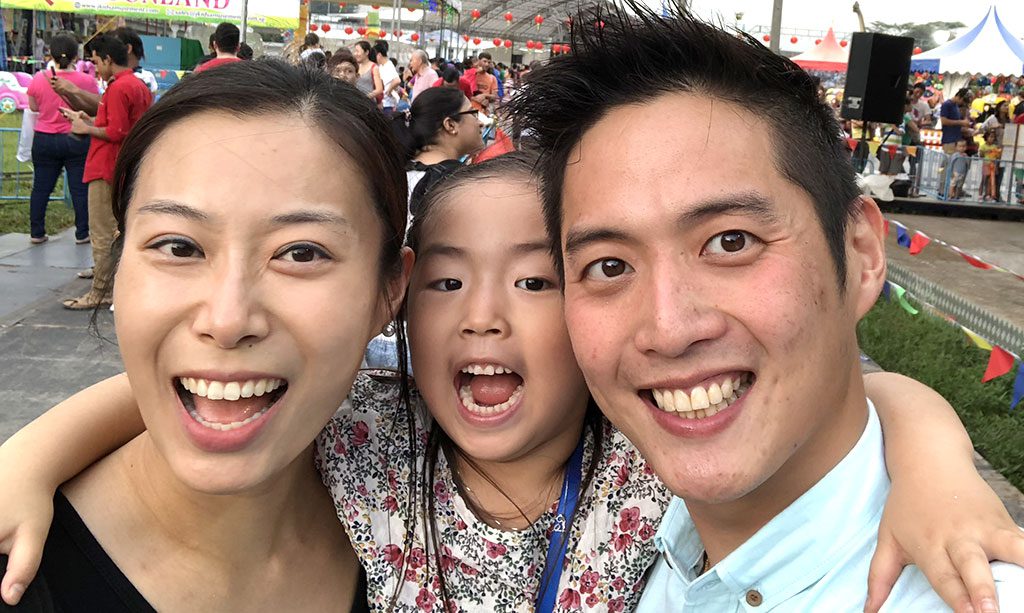
Zakaria with his wife and daughter.
When temptation struck, often in the wee hours of the morning, he would pray and the desire to consume drugs and get the euphoria that came with it would leave as fast as it came.
“I know that this God is real because one month passed, then three and six months and I was clean. I can’t do it on my own strength and I have failed many times in the past,” says Zakaria.
Zakaria was successfully rehabilitated after a year.
“I was so thankful to God that he helped me fight temptations when I couldn’t in the past so that even a hard core addict can still manage to stay clean throughout the year,” he says.
Seeing the change in him, his father also decided to go to church and came to know the Lord.
His girlfriend forgave him and flew back with their five-year-old daughter to Singapore last year. The couple got married in September and Zakaria was baptized shortly after at Bartley Christian Church. Since then, they have found a home at that church, and serve and worship God there together. His wife attends the Korean service while Zakaria attends the English service.
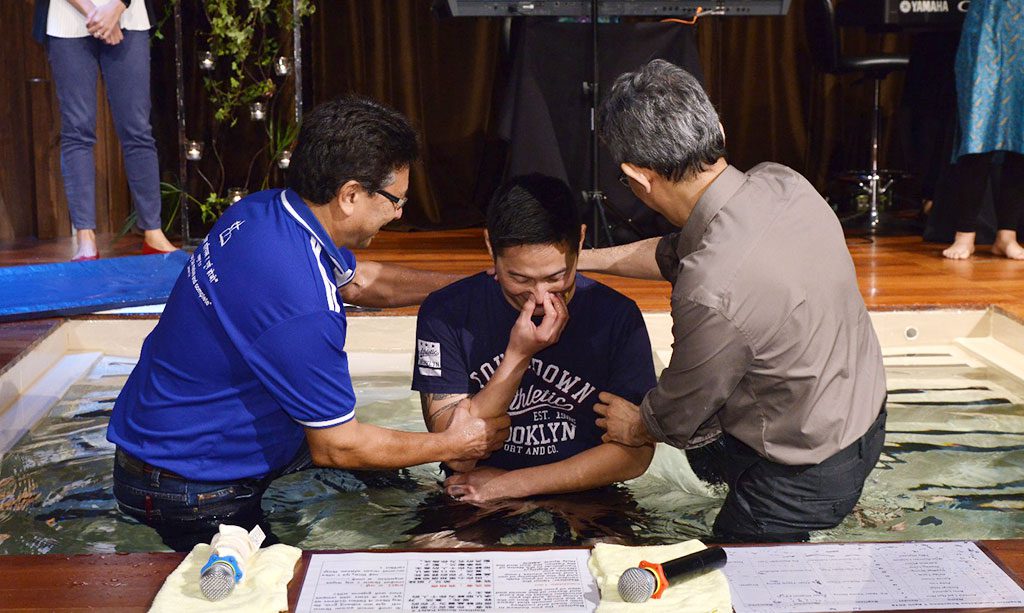
Zakaria getting baptized at Bartley Christian Church.
Looking Ahead
Today, Zakaria is getting to know God better by studying His Word at a school of Theology in the mornings.
“I am a new believer so I need to strengthen my foundation in God so as to build on my new identity in Him,” he says.
In the afternoons, he works part-time as an administrator for The New Charis Mission in Eunos to earn his own keep. Every Wednesday night, he volunteers his time with the elderly living at Ang Mo Kio. He makes house visits, befriends them and occasionally cleans their homes.
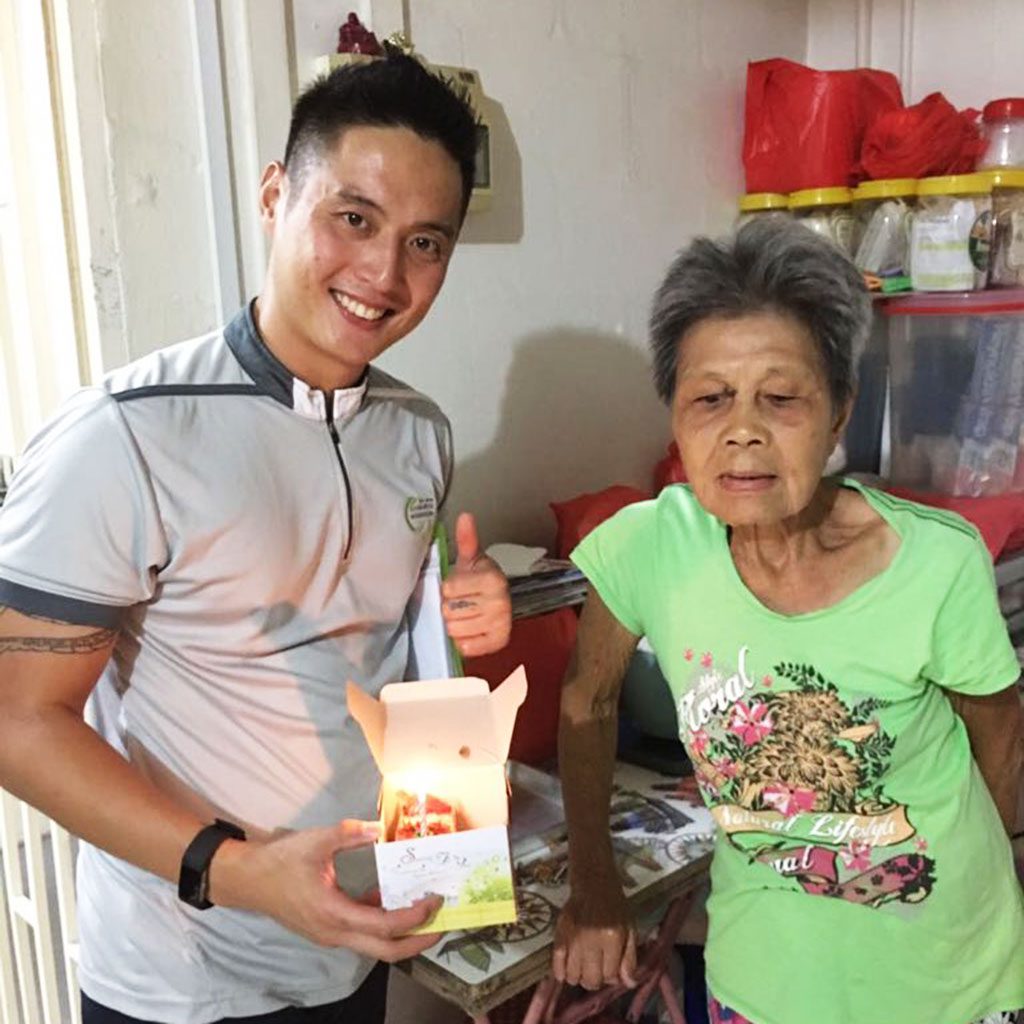
Zakaria spending time with an elderly.
“I know what it is like to be lonely and without support so I feel for the seniors. Relative to their plight of being abandoned by family members and having poor living conditions, I feel fortunate about my own situation,” says Zakaria.
His dramatic turnaround has surprised not only his family and friends, but also shocked him.
“I still struggle with feeling guilt over my past but I know God does not condemn me but loves me,” says Zakaria, whose favorite verse in the Bible is Psalm 1:1-2, which reminds him to delight in and meditate on the law of God:
Blessed is the one
who does not walk in step with the wicked
or stand in the way that sinners take
or sit in the company of mockers,
but whose delight is in the law of the Lord,
and who meditates on his law day and night.
Every day, he is reminded of God’s grace and mercy in protecting him.
“I am grateful I am able to help other druggies now but I am also cautious because the urge to consume drugs or make fast money still come,” he says. “But now I have learned how to be content, channel my thoughts elsewhere and trust that God has a plan for me.”
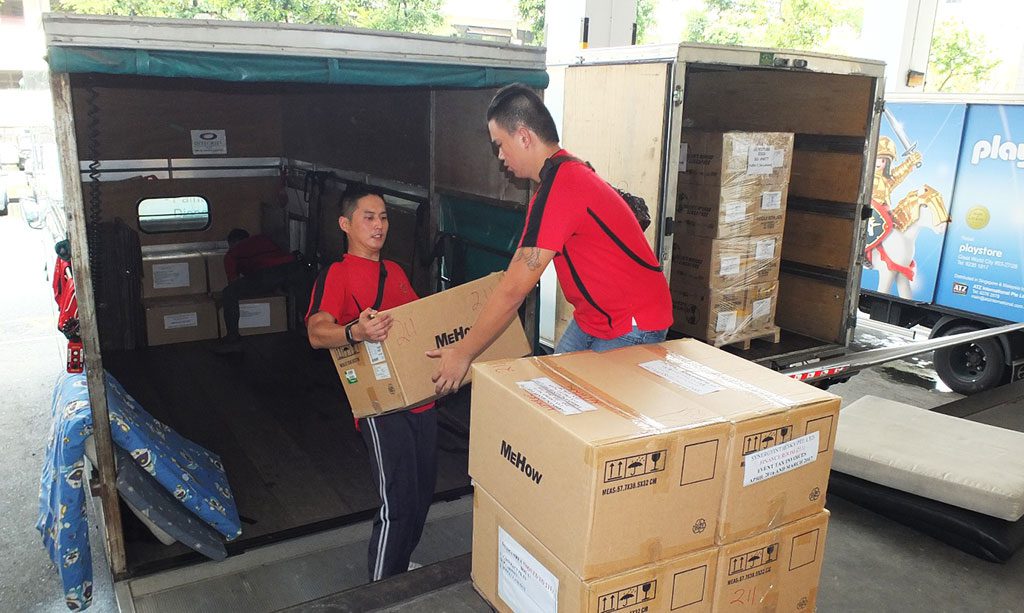
Zakaria helping out at The New Charis Mission.
After his Bible studies, he intends to finish unfinished business—since he dropped out of school in Australia—by getting a degree in hotel management. Through his service in the hospitality industry, he hopes to spread God’s love to others.
It is his dream to bring the love of God beyond the shores of Singapore. He wants to open an orphanage and reach out to homeless children in Indonesia, to teach, feed and clothe them.
“I hope to get to them when they are young and let them encounter God’s love,” says Zakaria. “My story went awry very early on so if I get to them when they are young enough, they will have a greater chance of living life right.”
* National Service (NS) is compulsory duty in the uniformed services for all Singaporean males upon finishing their tertiary education (but before any higher education). This usually includes two years of full-time service.

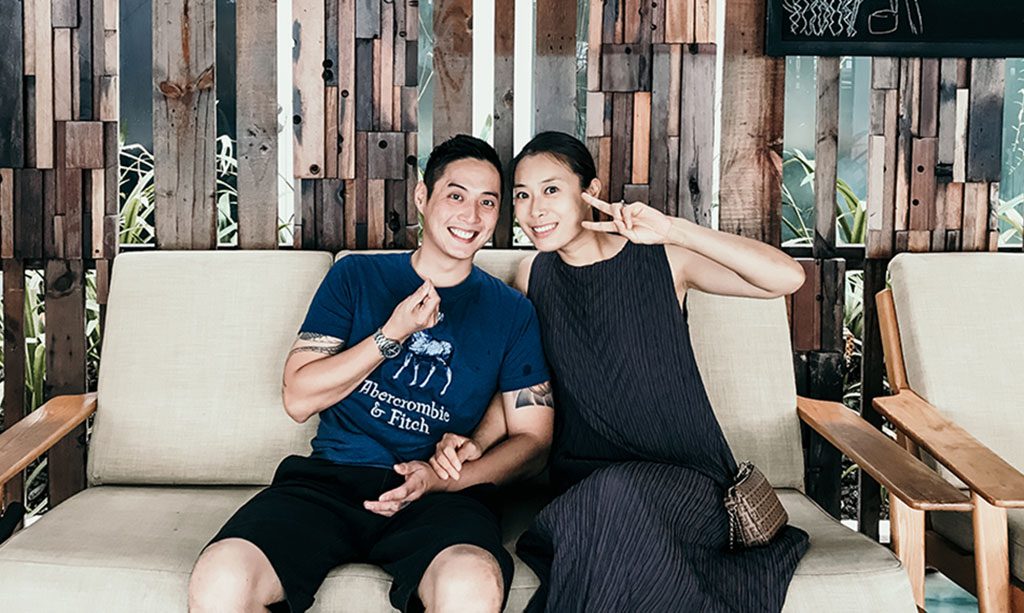
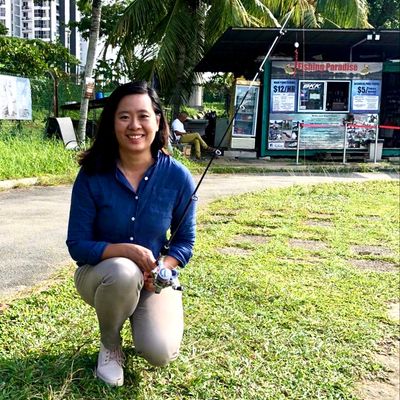

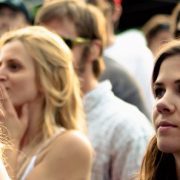






God is always the answer. 🙂
This is a wonderful story and I am sure it has touched and inspired many people. God bless you and your family Zakaria.